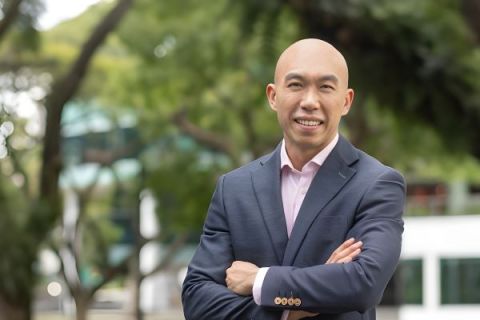
By Alistair Jones
SMU Office of Research Governance & Administration – The days of holding the same job for life are gone. Since the 1970s, work has become increasingly precarious and the need to switch to another job continues to rise. Causative factors include globalisation, outsourcing, recession, and new technologies. On a personal level, it is easy to feel just one misstep away from being fired.
"Job insecurity is one of the defining stressors of modern work," says Nina Sirola, an Assistant Professor of Organisational Behaviour & Human Resources at Singapore Management University (SMU). Her new research offers a fresh take on how employees experience job insecurity and reveals an underlying structural unfairness.
"Most research treats [job insecurity] as a one-size-fits-all problem. I was interested in who experiences it more intensely and why. That led me to think about early-life environments and the imprint they leave on how we experience uncertainty," Professor Sirola says.
Her research reframes job insecurity and has had the impact of gaining publication in the peer-reviewed Academy of Management Journal (AMJ), one of the leading academic journals in the field of management.
And the professor notes that her lens on a structurally unequal workplace experience "is already shaping how scholars understand the link between threat, inequality and employee wellbeing".
So, what is the innovation in the research that sets it apart?
"I combined life history theory from evolutionary psychology with classic stress theory. This allowed me to show that job insecurity doesn’t just hurt everyone equally. It hits harder for people who grew up with fewer financial resources. That’s a perspective missing in current research," Professor Sirola says.
Chain reaction
"When people feel insecure about their jobs, it drains their sense of control. That leads to emotional exhaustion and disengagement, two things that directly harm performance and increase the risk of being let go," Professor Sirola says.
"But crucially, this chain reaction is much stronger for people from poorer backgrounds. In contrast, those from especially wealthy backgrounds may actually feel more in control under threat and, in some cases, become more engaged.
The research finds that even among employees who have successfully reached high levels in their workplaces and are well-paid, those with poorer backgrounds are more affected by job insecurity. Does this mean we are forever marked by our upbringing?
"It’s not destiny but it is durable," Professor Sirola says. "The stress response system is like an operating system written early in life. It can be updated, but not easily. Awareness, supportive contexts and certain leadership interventions can help, but time alone doesn’t erase it."
It begs the question: Is there anything someone from a poorer background could do to ameliorate a higher sense of job insecurity?
"Yes, but it takes active effort," Professor Sirola says. "Building a strong sense of control through skill mastery, social support and cognitive reframing can help. Seeking out environments and leaders that reinforce agency and opportunity also make a difference."
But why is a perceived loss of control such a potent negative force on employees?
"Perceived control is about psychological agency; the belief that your actions can influence outcomes," Professor Sirola says. "Even in highly structured jobs, feeling capable of navigating challenges or securing stability protects wellbeing. When that belief is lost, especially under threat, stress becomes overwhelming and harder to regulate."
Call for action
It takes time for new research to have a practical impact outside academe, but Professor Sirola's work has obvious potential.
"While primarily academic in focus, the findings also offer actionable insights for policymakers and organisations aiming to design fairer work environments, especially during periods of change and uncertainty," she says.
"[The research] challenges the assumption that modern workplaces are fair and meritocratic. If job insecurity affects some workers more than others, regardless of their current performance or status, it’s not a level playing field.
"That’s a call for action in how we design work, evaluate people and lead teams. It also raises bigger questions for public policy: rising job insecurity may quietly undermine social mobility by penalising those who’ve already overcome early disadvantage."
Professor Sirola finds that job insecurity can act as an invisible mechanism that reproduces childhood inequalities.
"It taps into stress response patterns calibrated during childhood. If you grew up in financial scarcity, your system is wired to react more strongly to threat," she says.
"So even in adulthood, even in a stable job, you may feel less in control and burn out faster under stress. That becomes a hidden penalty that reproduces the very disadvantage you worked to overcome."
And could the research have an impact on HR decisions?
"Definitely. HR needs to be more attuned to hidden inequalities. Employees from less privileged backgrounds may not need more support because they are less capable, but because the same threat hits harder. Recognising that can lead to fairer restructuring, feedback, and development practices," Professor Sirola says.
Framing adversity
Can a leadership style help attenuate the effects of perceived job insecurity?
"Yes. In fact, I tested this. Leaders who framed adversity as an opportunity helped buffer the disengagement typically seen among poorer-background employees facing job insecurity. The messaging made a measurable difference, though it didn’t fully eliminate emotional exhaustion," Professor Sirola says.
"[In testing this], my main focus was on how leaders shape employees’ psychological responses during times of insecurity. The kind of messaging mattered. It wasn’t about who the leader was, but how they framed the situation that made the difference."
Will Professor Sirola be extending this research?
"Not directly. This project carved out what I see as a core theoretical insight: that early-life environments shape how people experience workplace threats," she says.
"Rather than incrementally extending it, I’m now applying similar logic to explore new domains where background and context collide, such as innovation, leadership, or voice under pressure. The big goal remains the same: understanding how inequality shows up in surprising places at work."
And the next project?
"I'm exploring how economic threat influences leadership behaviour and creative idea sharing. I want to understand not just how individuals react, but how they lead and shape their teams under pressure," Professor Sirola says.
Back to Research@SMU August 2025 Issue
See More News
Want to see more of SMU Research?
Sign up for Research@SMU e-newslettter to know more about our research and research-related events!
If you would like to remove yourself from all our mailing list, please visit https://eservices.smu.edu.sg/internet/DNC/Default.aspx

